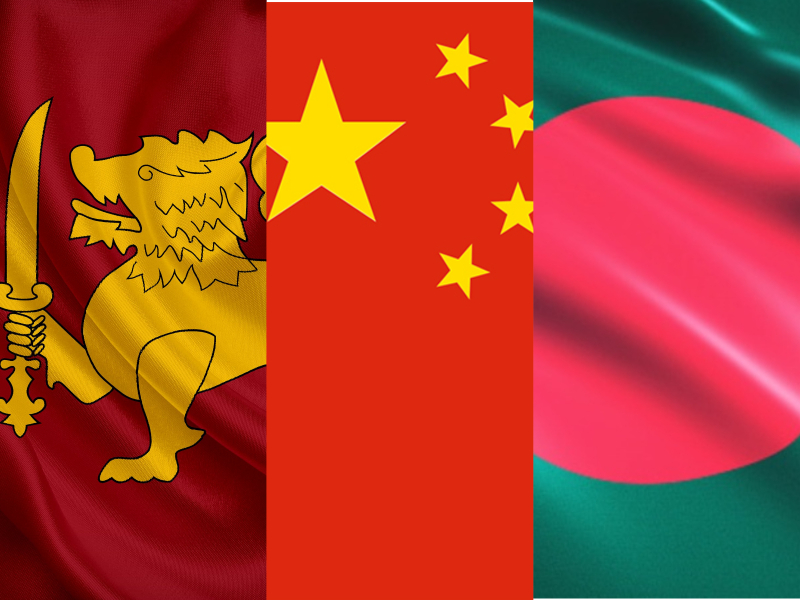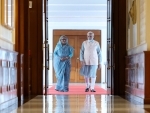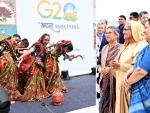Bangladesh
 Sri Lanka | Bangladesh
Sri Lanka | Bangladesh Bangladesh is not going the Sri Lanka way!
Dhaka, August 23: The London-based daily Financial Times (FT) recently published an interview with the Finance Minister of Bangladesh A.H.M.Mustafa Kamal. As per the report, Mustafa Kamal warned that developing countries must think twice about taking more loans through China's Belt and Road Initiative (BRI) as global inflation and slowing growth added to the strains on indebted emerging markets.
The FT report quotes the Finance Minister as having warned "that developing countries must think twice about taking more loans through China's Belt and Road Initiative as global inflation and slowing growth add to the strains on indebted emerging markets".
Mustafa Kamal also reportedly said Beijing should be more rigorous in evaluating its loans amid concern that poor lending decisions risked pushing countries into debt distress. He additionally pointed to Sri Lanka, where Chinese-backed infrastructure projects that failed to generate returns had exacerbated a severe economic crisis.
While all that has been cited above is part of the published interview and worth taking note of, a few days after its publication (9 August 2022), the spokesperson of the Ministry of Finance Gazi Towhidul Islam, wrote a rejoinder. He begins by stating that the headline of the FT report "Bangladesh's finance minister warns on Belt and Road loans from China" does not properly reflect the Minister's actual position.
.jpg)
Image credit: https://tradingeconomics.com/bangladesh/gdp-growth
The Ministry’s rejoinder states that the report mentioned Sri Lanka, which defaulted on its sovereign debt in May 2022 and is in negotiations with the IMF. The report said that BRI loans had "exacerbated a severe economic crisis" in that country but it did not say that Chinese loans led to the defaulting; rather the problem arose from ‘sovereign debt’.
The rejoinder states that Minister A.H.M. Mustafa Kamal in the interview, made it clear that any project in any country could be financed if it is proven financially viable. He stressed that Bangladesh would never take on finance from any authority if it were not feasible. The operative part of the rejoinder states that the Minister was “in no way warning about Chinese loans”. The very fact that Bangladesh had to clarify its position on the interview shows that Dhaka did not want China or for that matter any other country, to misread the diplomatic signals.
For instance, on China-Taiwan tension, Foreign Minister A.K. Abdul Momen had said it was closely following the developments in the Taiwan Strait and urged all parties concerned to exercise utmost restraint and refrain from any actions that may aggravate tensions and undermine peace and stability in the region and beyond. “Bangladesh reiterates her firm adherence to the One China policy and urges the parties concerned to resolve their differences in accordance with the UN Charter and through dialogue,” the Bangladesh Foreign Ministry had said.
From time to time, Bangladesh has made it abundantly clear that while it has signed on to the BRI, it is not dependent on China. Recently, when Wang Yi, Chinese Foreign Minister expressed his desire to visit Dhaka in the first week of August 2022, his Bangladeshi counterpart A.K. Abdul Momen categorically told him to reschedule his visit and conveyed to Wang that he should arrive in Bangladesh only in the second week of August.
Earlier in June 2022, Bangladesh had politely put China in its place, when the latter tried to stake its claim for the US$3.6 billion newly constructed multi-purpose Padma bridge project as part of Beijing’s BRI. Subsequently, South Korea also stepped in to counter the false Chinese claims, further exposing the hollowness of Chinese propaganda. Shortly after the Bangladesh government dismissed China’s bid to project the bridge over the country’s mighty river Padma, South Korea came forward to emphasise its role in the project, clearly snubbing Beijing’s attempts to claim the entire credit for the construction.
Without naming anyone, Bangladesh Foreign Ministry had earlier refuted the Chinese media claims that the Padma project was a part of the BRI. “It has come to the attention of the Ministry of Foreign Affairs that some quarters are trying to portray that the Padma Multipurpose Bridge, which is scheduled to be inaugurated on June 25, by the Hon’ble Prime Minister Sheikh Hasina has been constructed with the assistance of foreign funds and is a part of the Belt and Road Initiative,” the statement said. It clarified that the project “has been entirely funded by the Government of Bangladesh” and no “bilateral or multilateral funding agency has financially contributed to its construction.” The statement added that “Both Bangladeshi and foreign construction firms were engaged for the implementation of the project”.
Earlier in May 2021, the Bangladesh Government had asked China’s envoy to Dhaka, Ambassador Li Jiming, to maintain “decency and decorum” after he warned Dhaka from a public platform to desist from joining the Quadrilateral Group. “Obviously it will not be a good idea for Bangladesh to participate in this small club of four because it will substantially damage our bilateral relationship,” China’s Ambassador had warned Bangladesh at a meeting organised by the Diplomatic Correspondents Association on 12 May 2021. As expected, it was followed by the Bangladesh Foreign Ministry’s strongly worded statement. “As a sovereign country, Bangladesh will determine the course of its foreign policy in the interest of its people,” Momen said in a sharply worded riposte. Bangladesh has made it amply clear that it will not compromise with its national interest however, be it financial or other allurements from China.
.jpg)
Image credit: https://www.businessinsiderbd.com/economy/news/4558/india-to-overtake-bangladesh-in-per-capita-gdp-this-year
Bangladesh,which is a part of China’s BRI and enjoys growth in bilateral trade and investments, owes approximately US$4 billion to China, a small amount compared with its Gross Domestic Product of US$416billion, and its external debt of US$51 billion (2021 figures). The FT report had also claimed that "[Bangladesh] foreign reserves have also fallen to less than $40bn from more than $45bn a year ago". Officially, the “foreign exchange reserves of Bangladesh stood at only US$32.7 billion in June 2019. By August 2021, they had risen 47 per cent to US$48.1 billion, the highest ever recorded in the history of Bangladesh. Today, reserves stand at US$40 billion, enough for more than five months of import payments and beyond the risk threshold prescribed by the IMF (of three months). "The loan Bangladesh is seeking from the IMF thus appears to be pre-emptive, unlike in Sri Lanka where the government desperately needs funds.
Bangladesh is today a stable economy and its indices have outpaced even India in some areas. Notably, in 2018-2019, Bangladesh’s growth rate was way above Pakistan, even before the pandemic; it stood at 7.8 per cent compared to Pakistan’s 5.8 per cent. Bangladesh has a roadmap, Vision for 2041, aimed at ending absolute poverty and graduating into higher middle-income status by 2031 and becoming a developed nation by 2041.
That is precisely why it is necessary to dive deep into South Asia to differentiate between the experience of countries like Sri Lanka and Bangladesh, to understand how they have handled debt and more importantly, Chinese debt. The lesson learnt from their finance minister recalling the risks of taking loans (indirectly alluding to China) is an important landmark in Bangladesh’s development as a nation-state.



